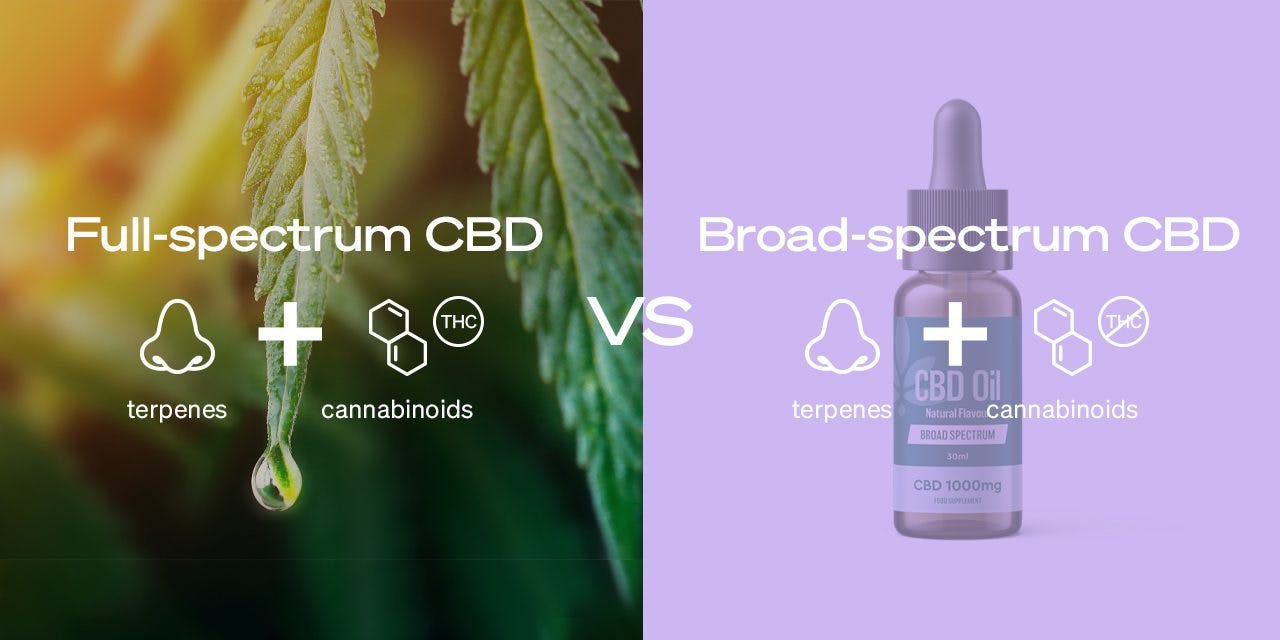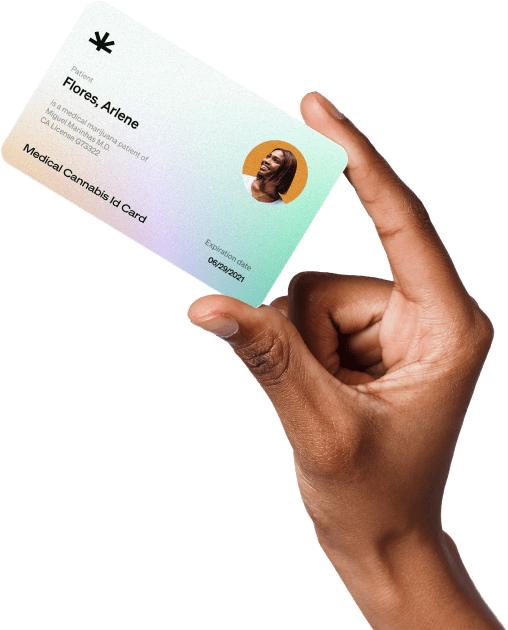What’s the Difference Between Full-Spectrum and Broad-Spectrum CBD?

Article written by
Emma Stone
Content reviewed by

Dr. Lewis JasseyMedical Director - Pediatric Medicine
Full-spectrum and broad-spectrum CBD are two of three main types of CBD extract. The main difference between broad-spectrum and full-spectrum CBD is THC content. Full-spectrum CBD contains tetrahydrocannabinol (THC), while broad-spectrum CBD does not.
However, these two products differ in other respects, too, such as the extraction process each undergoes and how they interact with the body’s endocannabinoid system. Understanding these two products’ differences can help you select the right product to address your needs.
Get your medical marijuana card
Connect with a licensed physician online in minutes.
What Is Full-spectrum CBD?
Full-spectrum CBD, sometimes referred to as whole plant CBD, contains the full complement of terpenes, cannabinoids, flavonoids, alkaloids, and other active compounds naturally present in the plant. This includes THC, a major cannabinoid associated with various therapeutic benefits.
It’s important to remember that although THC is an intoxicating cannabinoid, full-spectrum CBD extract doesn’t contain more than 0.3% THC, which is generally insufficient to cause psychoactive effects.
How It Works
Full-spectrum CBD oil is formulated by extracting CBD oil from the hemp plant using CO2 extraction, solvent extraction, or lipid extraction. The resulting extract is rich in CBD, with traces of THC, minor cannabinoids, terpenes, and other phytocompounds.
Uses
People often turn to full-spectrum extracts as a treatment for pain, inflammation, insomnia, anxiety, seizures, and stress.
There’s evidence that full-spectrum CBD extract can enhance specific effects compared to other kinds of CBD extract, such as CBD isolate. For example, in a 2018 study, whole plant CBD-rich cannabis extracts (containing THC and other active compounds) reduced the frequency of seizures among individuals with refractory epilepsy more effectively than pure CBD.
The participants in the study also required lower doses of the CBD-rich cannabis extracts. The researchers concluded that this was most likely due to the synergistic effects of CBD via the entourage effect (more on that below).
Potential Benefits
One of the most commonly cited benefits of full-spectrum CBD is linked to the entourage effect. The entourage effect refers to the idea that whole-plant hemp or cannabis extract boasts a unique synergy in its interaction with the body’s endocannabinoid system.
When all of the components of the hemp or cannabis plant are present in the extract, they create an effect that is more than the sum of its parts. Research suggests that the entourage effect may enhance therapeutic effects, such as improved efficacy and tolerability. What’s more, full-spectrum CBD extract more accurately replicates the flavor and aroma profile of the plant.
Risks and Drawbacks
Full-spectrum CBD products may not suit people sensitive to THC or those who wish to avoid THC due to drug testing. Although full-spectrum CBD derived from industrial hemp contains 0.3% THC or less, there’s still a chance this could be detected in a drug test.
In addition, some CBD products contain more THC than is advertised on the label, so you could receive more THC than you bargained for. Third-party testing can help you assess whether the THC levels advertised are accurate or not.
What Is Broad Spectrum CBD?
Broad-spectrum CBD extract contains minor cannabinoids, terpenes, and other beneficial compounds but does not contain THC. The THC content is removed during the extraction process.
How It Works
Like full-spectrum CBD oil, broad-spectrum CBD oil is created by extracting CBD from the plant using CO2 extraction, solvent extraction, or lipid extraction. It then undergoes a technique called chromatography.
Chromatography processes separate the THC from the extract while leaving all the other beneficial compounds in the final product. The broad-spectrum extract is then added to carrier oil.
Uses
Broad-spectrum CBD extract can treat various conditions, such as insomnia, anxiety, inflammation, and chronic pain.
It’s often favored by individuals looking to reap some of the benefits of whole-plant CBD extract but want to avoid products containing any trace of THC. There’s also evidence that broad-spectrum CBD may have unique therapeutic applications as a treatment for scalp inflammation and psoriasis.
Potential Benefits
Although broad-spectrum oil doesn’t contain THC, it still contains additional beneficial compounds in hemp, such as cannabinol, cannabichromene, and terpenes like myrcene and limonene. There’s evidence that an entourage effect (of sorts) still takes place due to the synergistic interaction of the cannabinoids and terpenes.
Risks and Drawbacks
One of the main risks associated with broad-spectrum CBD is that it can still contain trace amounts of THC. The CBD industry is still largely under-regulated, and some products have THC levels that differ from what is advertised on the label. It’s vital to check third-party potency tests before purchase to ensure the product is free of THC.
Ironically, the omission of THC in broad-spectrum cannabis can also be a drawback. Most literature on the entourage effect suggests THC is critical to harnessing the full synergy of whole plant cannabis. Those who use broad-spectrum CBD may not experience the same benefits as those who use full-spectrum. Moreover, higher doses of broad-spectrum CBD may be needed for a therapeutic effect, which can end up costing more overall compared to full-spectrum CBD products.
Similarities and Differences Between Full Spectrum CBD and Broad Spectrum CBD
The main difference between full-spectrum and broad-spectrum products is that full-spectrum CBD contains THC, but broad-spectrum does not.
To remove THC from broad-spectrum extract, the extract undergoes chromatography, which separates the THC from the mixture. Full-spectrum products are not subjected to this process.
Finally, the two extract types interact with the endocannabinoid system differently. Since full-spectrum CBD products contain THC, they activate the body’s endocannabinoid receptors differently than broad-spectrum CBD. Anecdotes suggest full-spectrum CBD extract may enhance symptom relief from chronic pain, but there’s no conclusive evidence.
How to Decide Which Is Best For You
Both full-spectrum and broad-spectrum CBD extract have many benefits and can ease pain, soothe inflammation, reduce anxiety, and diminish stress. Your personal preference regarding the presence of THC (or not) will be the deciding factor when selecting an extract.
When to Use Full-spectrum CBD
Full-spectrum CBD is well suited to people seeking a CBD product that contains the full complement of major and minor cannabinoids, terpenes, and flavonoids in the cannabis plant.
When to Use Broad-spectrum CBD
Broad-spectrum CBD products are ideal for individuals who want to experience the synergy of cannabinoids, terpenes, and other beneficial compounds in the hemp plant but don’t want to consume THC.
Broad-spectrum CBD extract is also ideal for athletes and individuals who may be subjected to random drug tests or those who live in locations where THC is illegal.
The Bottom Line
The main difference between full-spectrum and broad-spectrum CBD extract is the THC content. Those who wish to harness the therapeutic benefits of THC working with other beneficial phytocompounds can opt for full-spectrum CBD products. In contrast, those who want to enjoy whole-plant synergy without THC can consume broad-spectrum CBD products.
Get Your Medical Card
Connect with a licensed physician online in minutes.
Frequently Asked Questions
Is broad-spectrum CBD better for anxiety?
There’s no conclusive research exploring whether broad-spectrum or full-spectrum CBD is better for treating anxiety. However, individuals who are particularly sensitive to the effects of THC may find broad-spectrum CBD better suited to managing anxiety, as the extract has no THC ( THC can sometimes cause anxiety in high doses).
Does full-spectrum CBD do anything?
People use full-spectrum CBD to manage chronic pain, inflammation, mood disorders, and anxiety. Compared with CBD isolate, full-spectrum CBD can also help reduce seizures associated with epilepsy.
